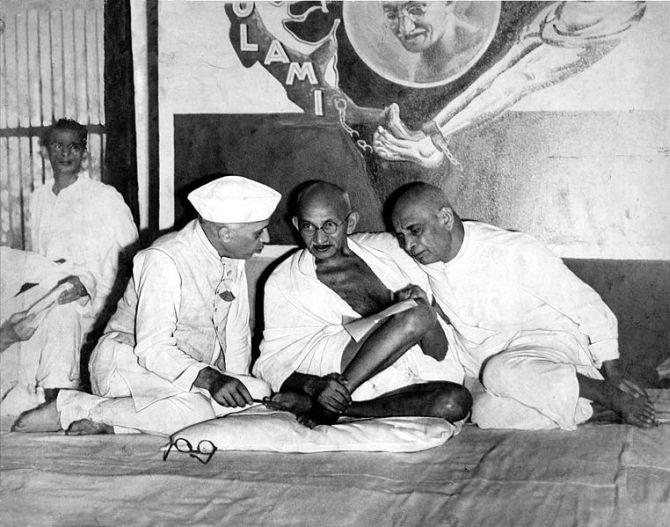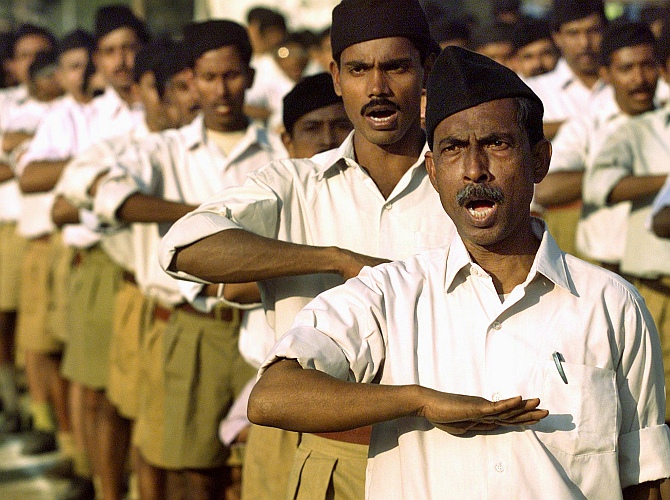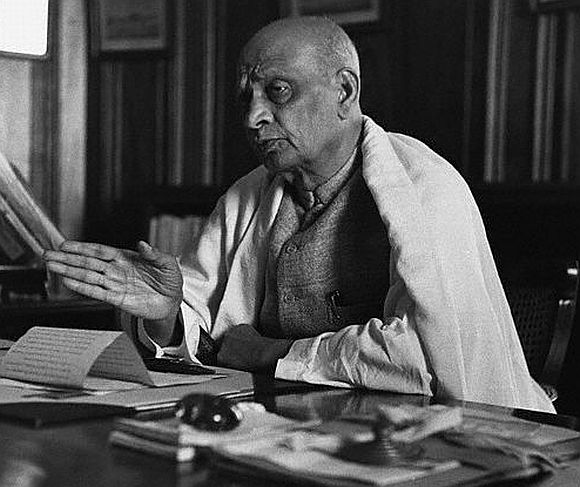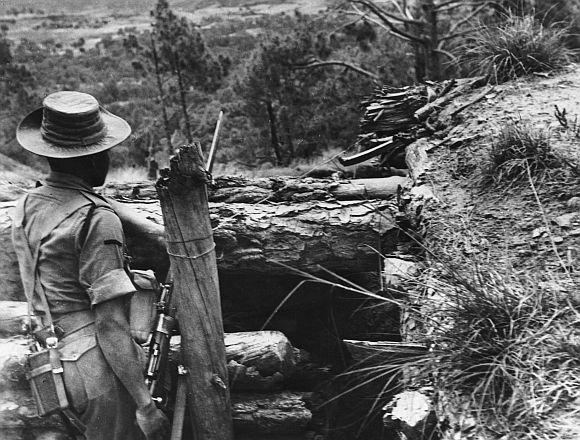 | « Back to article | Print this article |
Book reveals Nehru and Sardar Patel disagreed on Kashmir, China
Dinkar Joshi, author of more than 150 titles, is well-known for his biographies on Gandhi and Muhammad Ali Jinnah. His work has been translated in many languages including German. On the eve of Sardar Patel’s birth anniversary rediff.com publishes exclusive excerpts of his soon to be published book Sardar: The Saint Emperor.
The accused arrested for Gandhi’s murder were mostly associated with the RSS (Rashtriya Swayamsevak Sangh) or Hindu Mahasabha. Both the organisations known for their radical tendencies had played an important role in safeguarding the interests of the Hindus during the communal riots that had taken the toll of thousands of people across the nation. They were also involved in the activities instigating Hindu fundamentalism across the nation. The Muslim fundamentalism was on its peak and the leaders of these organisations firmly believed that the Muslim fundamentalism can be resisted only with the same kind of fervour. Based on the statements given by the accused in Gandhi’s murder, the home ministry imposed a legal ban on both these organisations.
In response to the ban, one of the sections of the Hindu community vehemently opposed it. The Muslim League, even after the partition of the country, was still carrying out its activities bearing the same name and official status across India. Ironically, if the Muslim League was still officially active, how could the Hindu Mahasabha and RSS be banned?
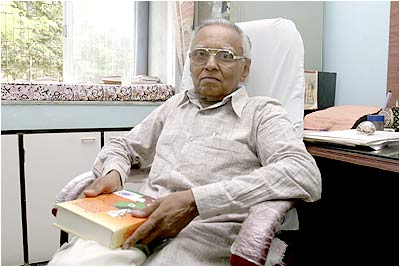 In spite of a large number of leaders and volunteers being arrested, there were many other members and sympathisers of these organisations across India. Some of them were employed in the government sectors. Jawaharlal felt a need of getting more and more members of these organisations arrested or removed from the posts of government offices. He believed that these employees who were in government jobs would never allow the ostracised Muslims to get justice. Having thought over this matter, Jawaharlal said to Sardar:
In spite of a large number of leaders and volunteers being arrested, there were many other members and sympathisers of these organisations across India. Some of them were employed in the government sectors. Jawaharlal felt a need of getting more and more members of these organisations arrested or removed from the posts of government offices. He believed that these employees who were in government jobs would never allow the ostracised Muslims to get justice. Having thought over this matter, Jawaharlal said to Sardar:
“Sardar, the suspects should be removed from the administrative system.”
“I have no problems with that. I shall immediately remove them but you will have to give me a list of such names. I shall work upon it. But please understand that we have to be ready to face the ill consequences of this action.”
Inset image: Author Dinkar Joshi
Click NEXT to read further...
'I sincerely advise you all to join the Congress and make the government strong'
Jawaharlal got the message. Sardar was referring to the people’s discontent and the legal hassles that could arise on account of dismissal of the government employees. He opined that the accused in Gandhi’s murder might be members of RSS or Hindu Mahasabha but one could not conclude from those associations that these organisations were involved in the conspiracy. Sardar believed that the accused were personally responsible for their nasty actions and just because they followed a particular ideology, it did not mean that these organisations were a part of the conspiracy.
Thereafter, Jawaharlal never sent any name lists to Sardar.
Most of the accused in Gandhi’s murder undergoing a trial belonged to Maharashtra. The RSS and Hindu Mahasabha volunteers in the Mumbai Province, Central India, Punjab, Delhi and other parts of India were arrested because many of them supported the accused. These volunteers were eventually released on the grounds of lack of evidence. Many of the senior leaders of these organisations met Sardar thereafter, and requested him to get the ban lifted on these organisations. Gandhi’s murder had left the nation reeling under a great shock. While the nation mourned over the loss of their beloved leader, the communal riots temporarily came to an end. Sardar patiently heard these leaders. He tried to appease them by saying to them that he did not ever doubt their love for the nation.
Having heard these consoling words from Sardar, these leaders revived their broken spirits. They started narrating to Sardar, the accounts of their unflinching services to the nation that they had offered to the nation at the cost of their lives during the pre-independent times. Sardar realised that some of the activities volunteered by them were actually selfless and risky for their lives. Sardar was certainly aware of their contribution and he acknowledged it by saying:
“I acknowledge your love for the country. I know you are not vagabonds or goons. Since, the Gandhi murder case is at present tried in the court of law, I cannot say how much you were involved in this murder.”
“Sardar, how reasonable is it to ask the Hindus to suppress their emotions when the whole country is burning because of the Muslim fundamentalism.”
“Communalism in any form is highly destructive. I believe that the Hindu Mahasabha, along with the Muslim League is equally responsible for creating such a tense atmosphere in the country. I acknowledge your patriotic spirit. I must say you have been misguided. I have only one advice for you. If you accept that and practise it, it will prove to be beneficial for the whole nation on a longer run. I sincerely advise you all to join the Congress and make the government strong and thereby, help the party to establish peace and harmony in India.”
The Hindu Mahasabha and the RSS were not convinced.
Click NEXT to read further...
'Sardar had not approved the contents of the draft that gave special status to Kashmir'
Jawaharlal Nehru was invited to the United States of America. This was his first official foreign tour as the prime minister of India. Along with America, he was visiting Great Britain as well as other European countries. Since the trip was planned for one-and-a-half months, Sardar was given the charge of the prime minister’s position for that period of time. However, the Kashmir matter was to be handled by none else but Gopalaswami Ayyangar.
The Kashmir matter had already been handed over to the United Nations Office as a disputed territory. While the other princely states had become a part of the nation, Kashmir was granted a special status. The Governor of Kashmir was known as Sadr-E-Riyasat and the chief minster of the state was given a special title of the prime minister. The state flag of Kashmir was also given an official recognition. Special restrictions were laid upon Indian citizens wishing to settle or get married in Kashmir. All these points were a part of the agreement signed by Jawaharlal after he had taken over this matter from the ministry of states.
It was in the presence of Mountbatten, that Nehru had discussed this matter with Sheikh Abdullah. He had also introduced a special article in the Constitution to incorporate these points. While Jawaharlal was on his foreign trip, Gopalaswami Ayyangar along with Sheikh Abdullah prepared a draft of this article. Kanaiyalal Munshi gave the final shape to this draft in the Drafting Committee, which was a part of the Constituent Assembly.
All the special privileges demanded by Sheikh Abdullah for Kashmir were included in this draft. Since Gopalaswami was the concerned minister for the Kashmir matter, before leaving for his tour, Jawaharlal had made all the necessary arrangements for him to put up this draft in front of the Congress members of the Constituent Assembly. Sardar had all along preferred to remain detached from this matter.
When Ayyangar presented this draft in the Congress meeting, there was a great uproar from all sides. None of them approved the idea of Kashmir being given a special status. Sheikh Abdullah who was present in the meeting desired a special status and a separate Constituent Assembly for Kashmir but at the same time wanted neither King Hari Singh nor his descendants to ever be Sadr-E-Riyasat of Kashmir. There was so much of commotion in the meeting that the meeting had to be adjourned.
Sardar Patel who was unaware of this article came to know about it for the first time in this meeting. In principle, he agreed with Kashmir being given a special status than other states, this was because of its physical and political features. Since the atmosphere that already heightened, Sheikh Abdullah did not dare put up other demands. He showed his protest by walking out of the meeting and making plans to return to Srinagar the same night.
Gopalaswami failed to convince the members of the party so he called up Sardar and said:
“Sardar, you are currently in charge of the prime minister’s position. If this article drafted by Jawaharlal is not approved tomorrow in the meeting, it will be considered as ‘No-Confidence’ in Jawaharlal. I request you to do the needful. Sheikh Abdullah has staged a walkout from the meeting. He wants to leave tonight for Srinagar.”
Sardar was seriously concerned about both the matters pointed out by Ayyanger. He feared if the party disapproved the draft recommended by Jawaharlal especially during his absence, it would be a matter of great shame on the part of the government. There was also a possibility of Sardar as an acting prime minister for being blamed for the disapproval of the said article in the Congress Working Committee meeting. Having thought over these matters, he promised Ayyanger that he would handle the party meeting the following day.
According to Sardar, Sheikh Abdullah’s walkout would have adverse repercussions in Srinagar. He had to be hold back. He requested Mahavir Tyagi, a Congress leader from Dehra Doon and an old associate of Gandhiji to talk to Sheikh.
A man of few words, Tyagi was as straightforward and forthright as Sardar. That night he himself went to the Delhi railway station and reached the Sheikh’s compartment. Sheikh was indeed surprised to see Tyagi.
Tyagi said:
“Sheikh saheb, I have come with a message from Sardar saheb.”
On hearing Sardar’s name, Sheikh became alert because he had noticed Sardar not participating in the arguments taking place in the meeting. All of a sudden, a message from Sardar was something that was unnerving.
“Sheikh saheb, it’s Sardar’s instruction to you not to leave Delhi,” Mahavir Tyagi said in an assertive voice.
“What does that mean?” Sheikh was perturbed.
“Sardar has not given any reasons. I think you clearly understand the meaning of it. It’s plain and simple,” Tyagi replied tactfully.
Sheikh thought for a moment. He was wondering if Sardar was trying to take him into captivity. Sheikh remembered those days when he had been put under arrest by King Hari Singh.
Without any further arguments, Sheikh picked up his luggage and said to Tyagi, “Let’s get down.”
The following day Sardar took control over the meeting of the Congress Committee. Sheikh Abdullah was present at the meeting. Sardar began the proceedings by saying, “The state of Kashmir now bears a special status because of the intervention of international forces and nomenclatures. Whatever provisions currently made or defined in the Constitution of India for the State of Kashmir may stand as subject to change in future. At this critical juncture, we should take such decisions so as to boost the courage and confidence of the people of Kashmir since it has already acceded to India. Simultaneously, the other states of India should also concur with the decision of granting the special status given to Kashmir.”
Sardar’s words had a mesmerising effect. The meeting ended with the draft being approved by the majority.
Sardar had not heartily approved the contents of this draft that gave special status to Kashmir. According to him, it was against the conventions of the treatment given to the other Princely States. Sardar remained emotionally disturbed for almost the whole day. His anxiety did not skip Shankar’s attention. Late in the evening, Shankar could not resist himself from asking Sardar:
“Sir, why did you accept this matter when you do not approve of it?”
“You are right. I have not liked it but at this stage, if I oppose this draft, it would mean a failure on the part of the prime minister.” Sardar paused and continued after a while, “After all, it all depends on how strong and united our country is!”
Shankar was of course, not convinced by this explanation but he preferred to remain silent. The conversation ended there.
Click NEXT to read further...
'What Sardar took as a warning, Jawaharlal took as a friendly move by China'
China, the neighbouring country of India was undergoing a civil war. There was total lawlessness and disorder in the country because of the clashes between the troops of Mao Tse-Tung and Chiang Kai-shek. During this time, the then British Commander-In-Chief wrote a note to the British government.
It said: “It is difficult to know the intentions of China. Whoever could be the winner --Mao Tse-Tung or Chiang Kai-shek -- but certainly the winner seems to be interested in acquiring Tibet. While China is busy with its civil war, it is in our long-term interest that we take the possession of Tibet.”
However, the British government did not take a note of it. After the Second World War, Britain almost became bankrupt and could not enterprise into any new warfare. Moreover, it was soon going to grant independence to India. Now China was to be India’s new neighbour. Why should the British increase one more enemy because of India?
The Commander-In-Chief shelved the file. Soon after this, the India sub-continent was partitioned and Tibet became a neighbour to India. The civil war had yet not ended in China. The British Commander-in-Chief wanted to take possession of Tibet because it was the British trait of being imperialist and colonisers. After independence, Sardar noticed that Tibet was being governed by their religious leader Dalai Lama.
Dalai Lama was then a boy of thirteen or fourteen years. Sardar envisaged that China’s possession of Tibet in future could put India into a perilous position. Unlike the British policy of imperialism, Sardar was not interested in colonising Tibet because imperialism was never a characteristic feature of the Indian civilisation. Nonetheless, it was important to take precautions against China’s future plans.
Sardar had sent messages to Jawaharlal about China’s possible intrusions but Jawaharlal had different views over the matter. He believed that China would never adopt the policy of expansion and that China would always remain a friendly neighbour to India because together they could give a strong fight to the western countries. The government of China had already sent official messages to the newly formed government of India that it would take peaceful measures to release Tibet.
Jawaharlal thought just as India had become free from the British rule in the same way, China would release Tibet because it had suffered enough by the hands of the British. While Sardar took this as a warning, Jawaharlal took it as a friendly move.
Sardar again warned Nehru:
“The language of this so-called friendly note is a warning for us. The Communists have never carried out any peaceful activities across the world. The North East people of India share the same physical features as that of Chinese and the Tibetans. They are Mongolians and we should not ignore the fact that their cultural traits are different from us. It is possible that China may take advantage of this situation and betray us.”
Jawaharlal refuted him by saying:
“China can never be an imperialist country. That it listens to us patiently nullifies all doubts.”
Soon after this when the Cabinet met to discuss the issues related to China, V N Gadgil agreed with Sardar. He said, “There has been no reference in past about any kind of enmity with China but who knows about the future? There is always a lurking danger of China taking away Tibet and moving ahead to acquire the north east regions of India.”
Jawaharlal mocked Gadgil and said:
“Gadgilji, you may not know the history of China but I am sure you know the geography of India. Don’t you know that the vast Himalayas stand tall between India and Tibet?”
Gadgil could not reply Jawaharlal but Kanaiyalal Munshi promptly intervened:
“Pandtji, if I may intervene, I am quite well-versed with not only geography but also history. History has certainly recorded the conquest of the Kanauj by the Tibetans in the 7th Century AD. The Tibetans had crossed the Himalayas with a lot of difficulty and came to rule India. It will not be so difficult for them to do so in the twentieth century.”
Jawaharlal stared at Munshi and rejected his point by uttering, “Nonsense!”
TOP photo features you missed last week
Click on MORE to see another PHOTO features...
